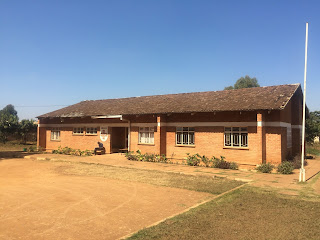The Centre for Youth Empowerment and Civic Education (CYECE)
is a charity organisation established in 1997. Its aim is to address socio-economic
development issues affecting children and young people in Malawi. CYECE, in
collaboration with the International Service, is implementing a project called ‘Promotion
of sexual and reproductive health and rights and education for girls’ in Dedza,
Salima and Mangochi.
 |
| The CYECE Office in Dedza, previously a Red Cross building and Church |
Along with our CYECE Community Facilitator, Max, we have conducted
activities in various schools on cross cutting issues such as Sexual,
Reproductive Health and Rights (SRHR) (e.g. teenage pregnancy), Nutrition, HIV/AIDS
and early marriages. Our target groups are girls and young women and before
activities began we conducted baseline surveys with schools and community
groups to identify issues that affect them the most. We could also identify
their existing knowledge and experiences. We conducted ‘pre-testing’ before
interviewing hundreds of people and this gave us the opportunity to test the questionnaire,
evaluate the questions and re-design them. After some training and pre-testing,
we were ready to go to the field to meet communities and really start to
understand their lives, the challenges they face and identify what role we
could play. We were given tasks from our Team Leaders, for example to research
things or identify opportunities.
 |
| Chrispin delivering a SRHR session to girls and young women in Bembeke |
As part of the ‘Active Citizenship’ concept,
Gus contacted the Forestry Commission and organised for us to get involved in a
tree planting project in Kasumbu organised by the German Development
Corporation. The community take ownership of the project and have a target of
preparing 100,000 seeds (80% will survive and grow). They are given the tubes,
seeds and training. The focus of the project is land resource conservation and
is based on successful models which have taken place in Ethiopia. We were able
to help with filling tubes as well as entertaining the children with games,
singing and dancing! We can work further with the same organisation to deliver
family planning sessions in the coming months as the increasing population
demands more from land resources.
 |
| Chrispin and Pelani preparing tubes before trees are planted in the rainy season |
Group synergy has been really good because we have been able
to plan and conduct activities as a team, sharing roles according to each
other’s skills and interests. However, it was more of a challenge for the UK Volunteers
to fully participate on all the activities because it was done in local
language, called ‘Chichewa’. Luckily enough, the in-country volunteers were on
hand to translate discussions which then allowed all volunteers to actively
participate, ask questions and give feedback. The UK volunteers also spent time
keeping crowds of children entertained with games, singing, drawing and
dancing!
 |
| The team! |
We quickly identified that young people are generally shy in
responding to questions on SRHR and it was frequently suggested that there is a
lack of confidence in general amongst girls. This came across more especially
in interviews, particularly if the interviewer was the opposite sex. Once we
realised this was the case we could re-organise the interviews so respondents
were more comfortable with the environment. It also encouraged us to consider
interventions that could help girls to increase their confidence.
On our most recent trip, we carried out activities in the
Mtakataka school zones. As a team, we often arrived late, however this is very
common here and referred to as ‘Malawian time’. If you organise to meet someone
at 8.30am, be prepared to wait until around 9.30am at least! It also takes at
least an hour for food to be prepared in restaurants in Dedza. They don’t typically
have lots of customers so food is prepared from scratch and nothing is
‘pre-cooked’. A local restaurant regularly frequented by volunteers is called
‘Winners’; from the outside it doesn’t look very appealing! However for K1000
(around £1) the team have chicken or beef, chips, rice and salad. The locals
see their food much quicker, although they tend to have Nsmia with vegetables.
 |
| Local restaurant, 'Winners' where chicken is cooked on the barbeque (braai) outside |
 |
| The most popular dish for some volunteers - chicken, rice, chips and salad, costs K1000 (£1.08). |
The ICS programme is non-skills based which means that
volunteers are recruited based on their attitude and personality. Having said
that, we have all been able to share our ideas so that processes, activities
and the general working environment can be improved. We get together as a team
and share our thoughts after each activity and in our Monday morning meetings. When
this happens, it really feels like we are making a difference and we know that
the experience will be better for our friends that will join Ernest and Jason
in October!
Written by Chrispin Solola, Team Dusty Dedza
No comments:
Post a Comment